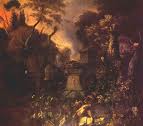[This is taken from Augustine Calmet's Phantom World, originally published in 1850, revised and edited by D. J. McAdam, 2010. Copyright as such.]

We see in history several examples of the dead bodies of excommunicated persons being cast out of consecrated earth; for instance, in the life of St. Gothard, Bishop of Hildesheim, it is related that this saint having excommunicated certain persons for their rebellion and their sins, they did not cease, in spite of his excommunications, to enter the church, and remain there though forbidden by the saint, whilst even the dead, who had been interred there years since, and had been placed there without their sentence of excommunication being removed, obeyed him, arose from their tombs, and left the church. After mass, the saint, addressing himself to these rebels, reproached them for their hardness of heart, and told them those dead people would rise against them in the day of judgment. At the same time, going out of the church, he gave absolution to the excommunicated dead, and allowed them to re-enter it, and repose in their graves as before. The Life of St. Gothard was written by one of his disciples, a canon of his cathedral; and this saint died on the 4th of May, 938.
In the second Council, held at Limoges, in 1031, at which a great many bishops, abbots, priests and deacons were present, they reported the instances which we had just cited from St. Benedict, to show the respect in which sentences of excommunication, pronounced by ecclesiastical superiors, were held. Then the Bishop of Cahors, who was present, related a circumstance which had happened to him a short time before. "A cavalier of my diocese, having been killed in excommunication, I would not accede to the prayers of his friends, who implored to grant him absolution; I desired to make an example of him, in order to inspire others with fear. But he was interred by soldiers or gentlemen (milites) without my permission, without the presence of the priests, in a church dedicated to St. Peter. The next morning his body was found out of the ground, and thrown naked far from the spot; his grave remaining entire, and without any sign of having been touched. The soldiers or gentlemen (milites) who had interred him, having opened the grave, found in it only the linen in which he had been wrapped; they buried him again, and covered him with an enormous quantity of earth and stones. The next day they found the corpse outside the tomb, without its appearing that any one had worked at it. The same thing happened five times; at last they buried him as they could, at a distance from the cemetery, in unconsecrated ground; which filled the neighboring seigneurs with so much terror that they all came to me to make their peace. That is a fact, invested with everything which can render it incontestable."
Disclosure: We are independently owned and the opinions expressed here are our own. We do have advertisements with links to other sites on our pages, and may receive compensation when you click on one of those links and/or purchase something from one of those sites.
Copyright © D. J. McAdam· All Rights Reserved